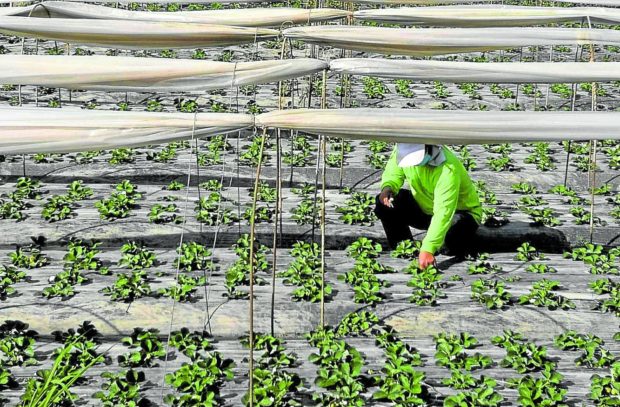Holidays good for vegetable, strawberry farmers in Benguet

FARM DAY A farmer tends to his plot at the strawberry farm in La Trinidad, Benguet. Initial reports by agriculture officials say farmers and traders of vegetables and strawberries profited slightly from the influx of tourists in Baguio City during the Christmas and New Year holidays. —EV ESPIRITU
BAGUIO CITY, Benguet, Philippines — Vegetables and strawberries grown in Benguet province were in great demand among tourists who visited the city during the holiday season, an official of the Department of Agriculture (DA) said on Wednesday.
Initial data from the DA showed that market traders enjoyed brisk sales in December, particularly of the strawberries grown in Benguet’s capital town La Trinidad, said Cameron Odsey, the DA Cordillera director.
Over 190,000 visitors spent their vacation in Baguio City starting November until mid-December. Odsey said many of the tourists had brought home strawberries and vegetables sold at the Baguio public market or at smaller vegetable stalls along roads back to Metro Manila and the lowland provinces.
The demand for Benguet’s salad vegetables like carrots, cabbages, lettuce, beans, and cauliflower was also high in December.
Benguet gardens supply 80 percent to 85 percent of highland vegetables sold daily in markets in Metro Manila and nearby provinces. Other supplies come from Mountain Province and Ifugao.
“Benguet vegetable deliveries reached the prepandemic average of 10 tons each day during the recent holidays,” said Jumelyn Buya, board secretary of the Highland Crops Agriculture Cooperative, which consolidates daily orders from suppliers in Metro Manila and other areas.
Welcome development
The year-end demand was a welcome development because traders barely accomplished a daily average of 6 tons in vegetable deliveries during most parts of 2021, Buya said.
She said the demand was low in 2020 when the pandemic first struck, leading to a Luzon-wide lockdown that shuttered businesses and restricted people in their respective homes.
Strawberries sold for P500 to P600 per kilo for bigger fruits, and P300 to P350 a kilo for smaller varieties, Buya said.
Most of those sold at the Baguio market come from La Trinidad where strawberry picking had also been a lucrative tourism side business for farmers until it was discontinued because of the pandemic.
Before the crisis, La Trinidad farmers used to harvest 1,175 metric tons of strawberries annually.
Toward the last days of 2021, strawberries were sold for as much as P700 a kilo at the Baguio market, which was attributed to the lower production.
Last year’s storms damaged many of the strawberry gardens, prompting farmers to reduce their risk by planting vegetables alongside replanted strawberries, said Garry Osngaw, a farmer in La Trinidad.
Price drop
Prices of vegetables have dropped now that the holiday crowds are gone.
But the demand could rise again with over 83,000 more visitors having been cleared to travel to Baguio from January to early March.
Testing requirements have been reimposed by Baguio for Metro Manila, Cavite, Bulacan and Rizal tourists entering the city from Jan. 6 to Jan. 18. The city government had also suspended the processing of leisure travel requests starting Jan. 2.
This is because these areas have been placed under the more stringent alert level 3 due to rising COVID-19 cases. It is not clear how the health restrictions would affect Baguio’s tourism flow.
The alert level 3 status of Metro Manila and its adjoining provinces has also alarmed vegetable producers because it may again force hotels and shopping malls there to reduce their orders for the two-week duration.